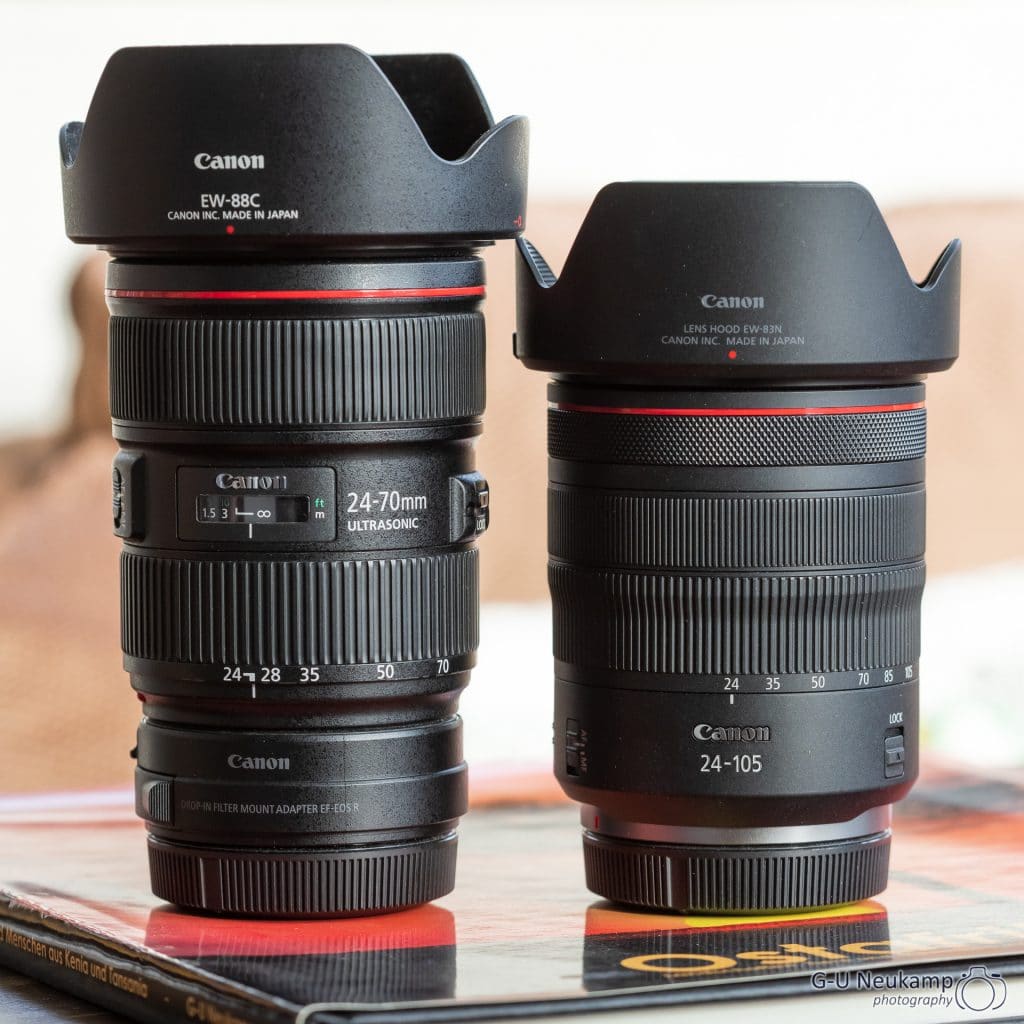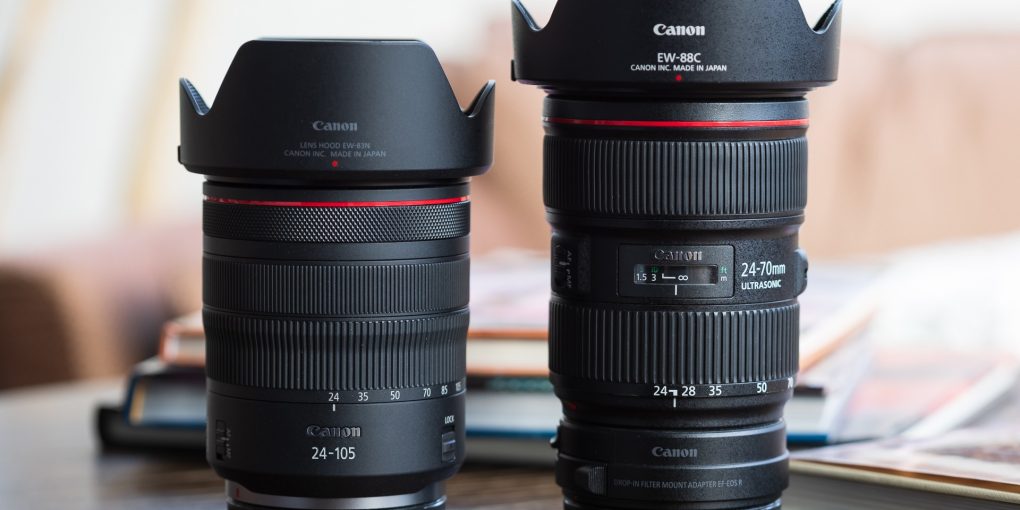Canon Rf 24-70 Vs Ef 24-70 II: Which Is Better?
Canon RF 24-70 is for mirrorless cameras, while the EF 24-70 II is for DSLR cameras, and both have differences in construction and functionality. Canon RF 24-70 is more expensive, designed for mirrorless cameras with short flange distance and has image stabilization.
On the other hand, the EF 24-70 II has a long flange distance and doesn’t have image stabilization. Despite the price difference, both lenses are great, and the choice depends on your camera type and preference. When choosing the right lens, it’s crucial to understand the differences and functionalities to make an informed decision.
We’ll compare Canon RF 24-70 vs. EF 24-70 II and explore the differences. While both lenses are excellent, they have different design and construction that sets them apart. We’ll also discuss other features, including weight, image stabilization, focus, zoom, focus breathing, and function ring. Ultimately, you’ll have a better understanding of the two lenses and make an informed decision.

Credit: m.youtube.com
Table of Contents
- Design And Build
- Optical Differences
- Compatibility
- Performance
- Price
- Sample Shots
- Frequently Asked Questions Of Canon Rf 24-70 Vs Ef 24-70 Ii
- What Is The Difference Between Rf And Ef In Canon?
- Does The Canon Rf 24 70 Have Image Stabilization?
- Can You Use Rf Lens On Ef Mount?
- Why Is Canon Rf So Expensive?
- Conclusion
- CallofPhotography
Design And Build
When it comes to the design and build of Canon RF 24-70 and EF 24-70 II, there are a few notable differences. The first is the weight and size comparison. The RF lens is slightly lighter and smaller than its EF counterpart. However, both lenses have excellent build quality. Another difference is the filter diameter. The RF lens has a larger filter diameter of 82mm, while the EF lens has a slightly smaller diameter of 77mm. Overall, both lenses are well-built and durable.
| Canon RF 24-70 | Canon EF 24-70 II | |
|---|---|---|
| Weight | 840g | 805g |
| Size | 88.5mm x 125.7mm | 88.5mm x 113mm |
| Build Quality | Weather-sealed construction, fluorine coating | Weather-sealed construction, fluorine coating |
| Filter Diameter | 82mm | 77mm |
The RF lens has a larger filter diameter, which may be an important factor to some photographers. However, the EF lens is still a solid option with a slightly smaller size and weight. Ultimately, the decision between the two lenses comes down to whether you are shooting with an RF or EF mount camera.
Optical Differences
Canon’s RF 24-70 and EF 24-70 II differ optically, with the RF having superior image stabilization, a lower minimum focus distance, and less focus breathing. However, the RF is more expensive and only compatible with mirrorless bodies, while the EF can be used with an adapter on both mirrorless and DSLR cameras.
| Optical Differences |
| Image Stabilization |
| The Canon RF 24-70mm f/2.8L IS USM and the Canon EF 24-70mm f/2.8L II USM both have image stabilization, but the RF version has an additional five stops of compensation compared to the EF version. |
| Minimum Focus Distance |
| The RF lens is capable of a minimum focus distance of just 0.21m while the EF lens has a minimum focus distance of 0.38m. |
| Focus Breathing |
| The RF lens exhibits less focus breathing compared to the EF lens. This means that the angle of view does not change as much when focusing on closer subjects with the RF lens. |
| Variable Zoom |
| The RF lens has variable zooming capabilities, which means it can adjust the zoom speed based on how quickly the zoom ring is turned. The EF lens has a fixed zoom speed. |
Compatibility
The Canon RF 24-70 and EF 24-70 II are both high-end lenses with equivalent focal lengths and maximum apertures. While the RF is designed for mirrorless bodies and comes with some advanced features, the EF is compatible with a wider range of cameras with the use of an adapter.
| Compatibility |
|---|
| The Canon RF 24-70mm lens is designed with a short flange distance for use with RF mount cameras, while the EF 24-70mm II lens is designed with a longer flange distance for use with EF mount cameras. This means that an EF lens can be used on an RF camera body with an adapter, but not the other way around. It is important to note that while EF-S lenses can be used on EF mount cameras, they may not cover the full frame sensors found in certain camera models. It is not possible to use RF lenses on EF or EF-S mount cameras as there are no current adapters available. The cost difference between RF and EF lenses can be significant due to the advanced technology found in RF lenses. |

Credit: fstoppers.com
Performance
The Canon RF 24-70 and EF 24-70 II are both great lenses, with the RF being slightly better but at nearly double the price of the used EF mkii. The RF lens has image stabilization and is designed for mirrorless bodies, whereas the EF is compatible with DSLRs with an adapter.
There are some optical differences and a variation in the minimum focus distance between the two lenses.
|
Auto Focus Speed The autofocus (AF) speed is faster in RF 24-70 compared to EF 24-70 II. Canon RF lenses are designed to work with Canon’s mirrorless cameras which use a different focusing system than EF lenses. The RF lenses use an improved autofocus algorithm which results in faster and more accurate focusing. |
|
Function Ring RF 24-70 has a programmable control ring which effectively doubles as a customizable dial, allowing photographers to adjust camera settings like ISO, aperture, and shutter speed without looking away from the viewfinder. On the other hand, EF 24-70 II has no such user programmable ring. |
|
Zoom Mechanism When it comes to zooming in or out, both lenses work similarly. However, the RF lens doesn’t have as much zoom torque and feels smoother in its operation than its EF counterpart. |
|
Audio Noise The RF 24-70 lens has a new Nano USM motor and autofocus system that is virtually silent. Even when adjusting camera settings using the customizable function ring, it generates hardly any noise. In contrast, the EF 24-70 II lens is not completely silent, generally creating some audio noise. |
Price
|
Price: When it comes to comparing Canon RF 24-70 with Canon EF 24-70 II, the cost difference is quite significant. The RF lens is almost double the cost of the EF lens. The RF lens is priced at around $2,300 while the EF lens can be purchased for around $1,400. However, the price difference can be justified due to the features and advantages that the RF lens offers. Worth the Investment? Investing in the Canon RF 24-70 lens is definitely worth it, especially if you have a mirrorless Canon camera. The RF lens has a short flange distance compared to the EF lens, making it more compact and lightweight without compromising on image quality. It also features new technologies such as a customisable control ring and improved autofocus system. However, if you are on a tight budget or already own the EF lens, it will still give you outstanding image quality and performance. |
Sample Shots
The Canon RF 24-70 and EF 24-70 II are two lens options for Canon cameras. Comparing these lenses with sample shots could help determine which lens is the better choice for a specific photography need.
| Comparison Images |
| When it comes to night photography using Canon RF 24-70 vs EF 24-70 II lenses, there are some noticeable differences. The RF lens has a slightly wider aperture, which can give better low-light performance. In our sample shots, the RF lens produced sharper images with less noise compared to the EF lens. The autofocus system on the RF lens also performed better in low light. However, both lenses produced excellent image quality, and the difference may not be noticeable in all situations. It’s worth noting that the RF lens is more expensive than the EF lens, but it’s also designed specifically for Canon’s mirrorless cameras, while the EF lens can be used with an adapter. |

Credit: neukamp.de
Frequently Asked Questions Of Canon Rf 24-70 Vs Ef 24-70 Ii
What Is The Difference Between Rf And Ef In Canon?
EF lenses have a long flange distance while RF lenses have a short flange, meaning an EF lens can be used with an RF camera with an adapter, but not the other way around. Also, RF lenses are designed to be attached to mirrorless bodies, while EF lenses are designed for DSLR bodies.
Does The Canon Rf 24 70 Have Image Stabilization?
Yes, the Canon RF 24 70 has image stabilization.
Can You Use Rf Lens On Ef Mount?
No, RF lenses cannot be used on an EF mount. However, an EF lens can be used on an RF camera using an adapter. This is due to the difference in flange distance between the EF and RF mounts. The RP is a full-frame camera and EF-S lenses are designed for APS-C sensors, so they can only cover the middle of the RP’s sensor.
Why Is Canon Rf So Expensive?
Canon RF lenses are expensive due to the advanced technology that is used in the lens. The RF lenses have short flange distances which provide better image quality and wide aperture settings. Additionally, the RF lenses have image stabilization, focus breathing, and other unique features that make them superior to EF lenses.
This technology and features are what make RF lenses expensive.
Conclusion
After thoroughly comparing Canon RF 24-70 and EF 24-70 II, it is clear that both lenses are exceptional in their own ways. While the RF lens has the advantage of being designed specifically for mirrorless cameras and having better image stabilization, the EF II lens is still a great option for those with an EF mount camera.
The decision ultimately depends on personal preference and budget. Whichever lens you choose, both options are sure to deliver high-quality results.
I am a photography enthusiast turned blogger, sharing my passion and expertise on this blog, "CallofPhotography." Growing up surrounded by nature, I developed a love for capturing moments through my lens. After studying Fine Arts with a focus on photography, I launched my blog to share tutorials, gear reviews, and my own photographic work. Through engaging storytelling, I invites readers to join her visual journey, inspiring and empowering photographers of all levels worldwide.


